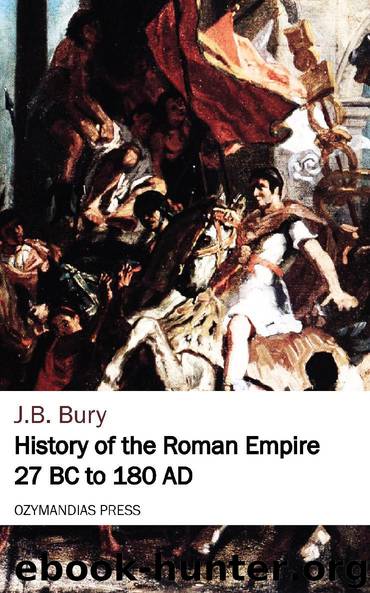History of the Roman Empire 27 BC to 180 AD by J.B. Bury

Author:J.B. Bury
Language: eng
Format: epub
Publisher: Ozymandias Press
THE WARS FOR ARMENIA, UNDER CLAUDIUS AND NERO.
~
THE STRUGGLE BETWEEN ROME AND Parthia for the possession of Armenia, was renewed in the reign of Claudius. This struggle was perpetually being decided and perpetually recurring. The Romans were determined to keep their hold over a country which was a ground of vantage for either realm against the other; while the Parthian monarchs tried, whenever they got an opportunity, to supplant Roman influence and reduce the land to dependence on themselves. Warlike demonstrations on the part of Rome were generally sufficient to make the Parthian kings withdraw their pretensions to Armenia and adopt a respectful attitude to the Roman Emperor; for they were constantly hampered by wars on other frontiers of their dominion and by domestic dissensions. These repeated settlements of the Armenian question are marked by the same general features. Rival pretenders to the throne of Armenia are supported by Rome and Parthia; the Parthian kingdom is distracted by civil war or excited into discontent against the reigning monarch, and there is a movement in favor of some scion of the Arsacid house who is living in exile or as a hostage at Rome; he is supported by Roman arms, but by an inevitable reaction is soon rejected; and the war ends with the acknowledgment of Roman supremacy in some form in Armenia. It will be remembered that Tiberius had established the overlordship of Rome in 20 BC, that it was again confirmed by Gaius Caesar in 2 AD. Again, in 18 AD, the Parthians submitted at the appearance of another presumptive heir to the Empire; and recently, the energetic action of Lucius Vitellius had thwarted the schemes of Artabanus III.
But what had been well done under the auspices of Tiberius, was immediately undone by the caprice of his successor. Gaius summoned Mithradates, the new king of Armenia, to Rome, deposed him, and sent him into exile. At the same time he recalled Vitellius in disgrace from his government of Syria. This was an opportunity for the Parthians, and they did not fail to seize the coveted land. Thus, when Claudius came to the throne, one of the tasks which devolved upon him was the recovery of Armenia. Mithradates was immediately recalled from exile, and, restored to his royal dignity, he set about recovering his kingdom with the help of his brother Pharasmanes, king of Iberia. Artabanus III was now dead, and Parthia was disturbed by a war for the succession between his sons Gotarzes and Vardanes. Gotarzes had come to the throne and made himself detested by his cruelties. One of his acts was the murder of his brother Artabanus, with his wife and son. His subjects accordingly sent for his other brother Vardanes, an enterprising prince, who was then at a distance of 400 miles from the court. He is said to have traversed this space in two days; and Gotarzes, completely surprised and terrified, fled. Seleucia alone, which had held out against his father, declined the rule of
Download
This site does not store any files on its server. We only index and link to content provided by other sites. Please contact the content providers to delete copyright contents if any and email us, we'll remove relevant links or contents immediately.
| Africa | Americas |
| Arctic & Antarctica | Asia |
| Australia & Oceania | Europe |
| Middle East | Russia |
| United States | World |
| Ancient Civilizations | Military |
| Historical Study & Educational Resources |
The Mysteries of Mithra by Cumont Franz(1365)
The Fall of Carthage by Adrian Goldsworthy(1319)
Sacred Britannia: The Gods and Rituals of Roman Britain by Aldhouse-Green Miranda(1166)
Letters from a Stoic (Classics) by Seneca(1052)
The Ghosts of Cannae: Hannibal and the Darkest Hour of the Roman Republic by Robert L. O'Connell(994)
Selected Political Speeches by Marcus Tullius Cicero(992)
The Satyricon by Petronius(982)
Fall of the Roman Republic (Penguin Classics) by Plutarch(977)
The Poison King: The Life and Legend of Mithradates, Rome's Deadliest Enemy by Adrienne Mayor(977)
Rubicon: The Triumph and Tragedy of the Roman Republic by Tom Holland(961)
Rome's Gothic Wars: From the Third Century to Alaric by Michael Kulikowski(952)
Hadrian and the Triumph of Rome by Everitt Anthony(899)
The Roman History by Cassius Dio(882)
In Defence of the Republic by Cicero(877)
Delphi Complete Works of Cicero by Cicero(828)
Letters from a Stoic by Seneca(823)
The Spartacus War by Strauss Barry(805)
Marcus Aurelius by John Sellars(803)
The Twelve Caesars (Penguin Classics) by Suetonius & Robert Graves(785)
